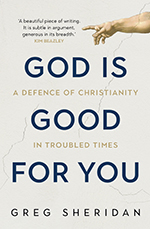When Rod McArdle’s son, Brendan, was born in January 1991, he was almost too tiny to imagine, just a bare 618 grams.
Rod and his wife, Sheryl, struggled as any new parents would with the thought that Brendan might not survive. They knew one thing for sure: they loved their son without qualification.
“We thought the issue was life and death for Brendan. We didn’t realise all the other complications that could arise. After six weeks the brain scan showed spastic quadriplegia, cortical blindness and problems swallowing. It was like our lives had hit a brick wall. I had just switched jobs and not made a good career move. Victoria was in recession. So always having had a dream run, I was struggling.
“It was like hitting a brick wall at 150 miles an hour. Brendan came home from hospital on oxygen. After three weeks at home he was then two weeks in the children’s hospital. The children’s hospital became our second home. There were only two possible outcomes spiritually. You could say: God is all powerful and I don’t want anything to do with Him. Or you could say: God is all powerful, His essence is love, the world is fallen, I don’t understand all the reasons, but I’ll trust Him. You either walk away, or you cling on.
“We clung on, and as we clung on our Christian life started to take off. Work was very difficult. Brendan’s situation was diabolical. He would vomit three to five times a day. He’d turn blue. We’d have to turn him upside down to keep him breathing.”
At this very time, Rod’s involvement with Christian life deepened: “I was asked to join a new missionary society to send missionaries overseas. I was involved in training and helping and being a contact point. We sent six or eight people to the far corners of the earth. I saw reports from orphanages in Romania, from young Christians in Moscow, of God doing great things for them. I did this for some years and was just exhausted. I said: Lord I can’t keep this up. But there’s no-one to replace me. If You want me to leave I want to receive a call by 4.00 pm.”
Sure enough, at 3.58 the phone rang and Rod felt he could leave the organisation in good conscience. He was head-hunted for a new job interstate and he and the family moved on: “It was my first real experience of a personal interaction with the Lord, as opposed to a doctrinal interaction.”
But the testing for Rod and his family would not remain at the merely exhausting level of caring for Brendan and maintaining a good family and a Christian commitment. In February 2001, Sheryl was unexpectedly diagnosed with leukaemia. Later that year a corporate reorganisation meant Rod’s job interstate came to an end: “We returned to Melbourne with me very unsure what the Lord wanted me to do. So I was back in Melbourne with the ego a little dented, my wife with severe illness and a son needing 24-hour-a-day care. I had had a word that the Lord wanted me to go into full-time ministry. But I thought: with Brendan, I don’t know. I thought: will I go back to senior corporate life and earn the money to pay for all the help we’ll need?
“Sheryl said: ‘Go away for a weekend and listen to the Lord about it.’ So I enrolled to do a graduate diploma at Ridley College [School of Theology and Ministry], thinking that [corporate] jobs will come up while I’m doing it. The jobs didn’t come and Sheryl’s health deteriorated.”
But then, as happens sometimes, things changed for the better. Sheryl went into remission and Rod converted his graduate diploma into a Masters degree. The college encouraged him to go into Anglican ministry. He knocked on the door of the Anglican diocese; the bishop said the diocese would love to have him. He told the diocese he would have very little flexibility about moving from one location to another. He was ordained into the Anglican priesthood in 2005, and appointed to a parish as a curate. After two years of that he became the vicar of his own parish.
It was during this period that I first got to know Rod. Mostly, at our meetings, he didn’t talk about Brendan. He didn’t avoid the subject, but our conversations mostly concerned theology, international affairs and politics. Early on he had explained about Brendan’s needs and the social limitations these imposed on Rod and his wife—Brendan could not really be left alone, and respite care and the like were vital and good quality, but limited.
Rod was not remotely on the lookout for sympathy but the reality of Brendan’s condition was always there. It would come through occasionally in passing remarks about needing to get up in the middle of the night to move Brendan’s position in bed so that he didn’t get bed sores, or the need to change Brendan’s nappy.
Then, in 2010, Sheryl’s condition worsened again. With great bravery she underwent a series of tough, gruelling treatments: “Early in 2011 Sheryl developed hip problems and scans revealed that she had a massive metastasised melanoma in her hip. They thought she might have six months. In May 2011 she went for surgery for a hip replacement.
“Complications arose in the surgery and Sheryl went back to the Lord.”
I attended Sheryl’s funeral service at Rod’s church, and it was packed, with Brendan dressed handsomely and sitting proudly in his wheelchair and the whole congregation there to give thanks for Sheryl’s life. With extraordinary courage, Rod preached at the service himself. He didn’t talk about his wife explicitly but rather about the doctrine of the resurrection which we can all look forward to.
This was a rough time for Rod, but he maintained his ministry, maintained his family, continued to look after Brendan and remained a friend to all his many friends. At the point of writing, Rod, now in his sixties and a lone carer, was following the professional advice of the state authorities to find a place for Brendan in a residential care home, near to Rod, where he can see him all the time.
When we speak, Rod has looked after Brendan for 27 years, much longer than anyone initially expected Brendan to live. Whenever he talks of his son, Rod’s voice is filled with affection. I ask him to consider and respond to the views of the famous atheist philosopher Peter Singer, who in Animal Liberation wrote: “There will surely be non-human animals whose lives, by any standard, are more valuable than the lives of some humans. A chimpanzee, a dog, or a pig, for instance, will have a higher degree of self-awareness and a greater capacity for meaningful relations with others than a severely retarded infant or someone in an advanced state of senility.” Peter has argued that it would be ethical to kill severely handicapped babies if their parents do not want them.
Rod’s answer: “My response is one of deep sadness—sadness that the writer misses the intrinsic value of every person, irrespective of what any given society might deem to be their ‘handicap’. That worth flows from each person being loved by their creator. The Lord sees every person as having the same intrinsic worth—and it is high worth. I recall Peter Singer on the ABC’s Q&A in August 2012 heralding the virtues and values of ‘selected infanticide’. It was painful to listen to such philosophising. And so divorced from the reality of our son, Brendan. Massively disabled, enormous health struggles, especially in his early years. And yet, everywhere he goes he is a beacon of light and love, and blesses all who have the privilege of caring for and/or interacting with him.”
In another conversation, occasioned because of Rod needing to make some practical arrangements regarding Brendan, he mentions to me that while Brendan’s body provides some difficulties, he just “radiates joy and love on everyone around him”.
Rod recounts a pilgrimage he once took to the holy sites in Israel: “On a kibbutz on the Sea of Galilee, I was remembering the words of Jesus: ‘Follow me’. I had a profound vision in my mind of Jesus walking up the side of the Sea of Galilee and he sees this little Rod McArdle and he says: ‘Follow me’.”
That’s just what Rod has done.

Extracted, with permission, from God is Good For You, by Greg Sheridan (Allen & Unwin, 2018).
How helpful was this article?
Click on a star to rate it!
5 / 5. 2
Be the first to rate this post!
Greg Sheridan
Related posts
Subscribe
Receive personalised articles from experts and wellness inspiration weekly!

